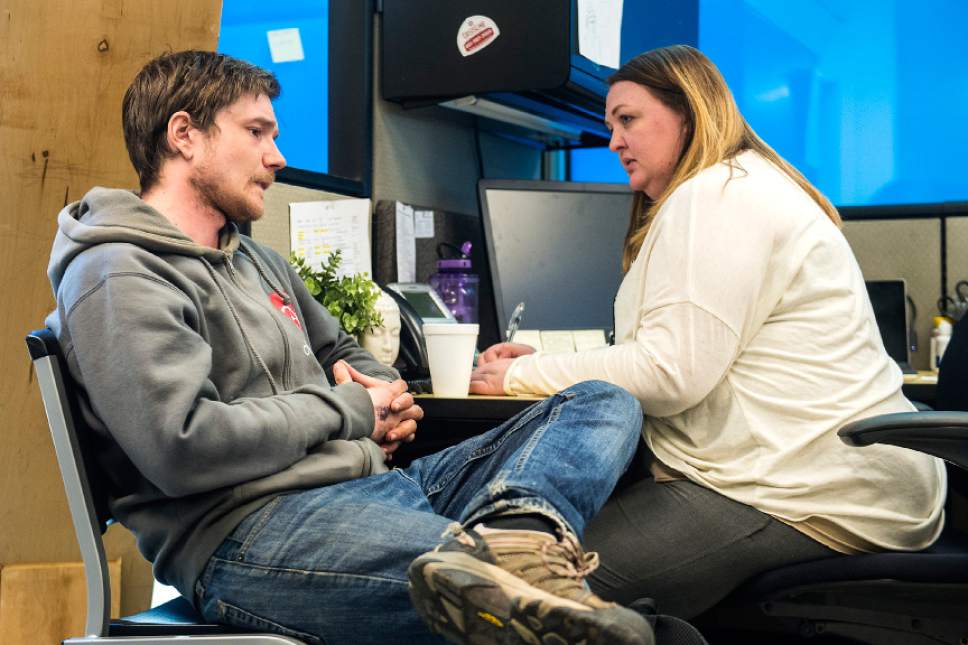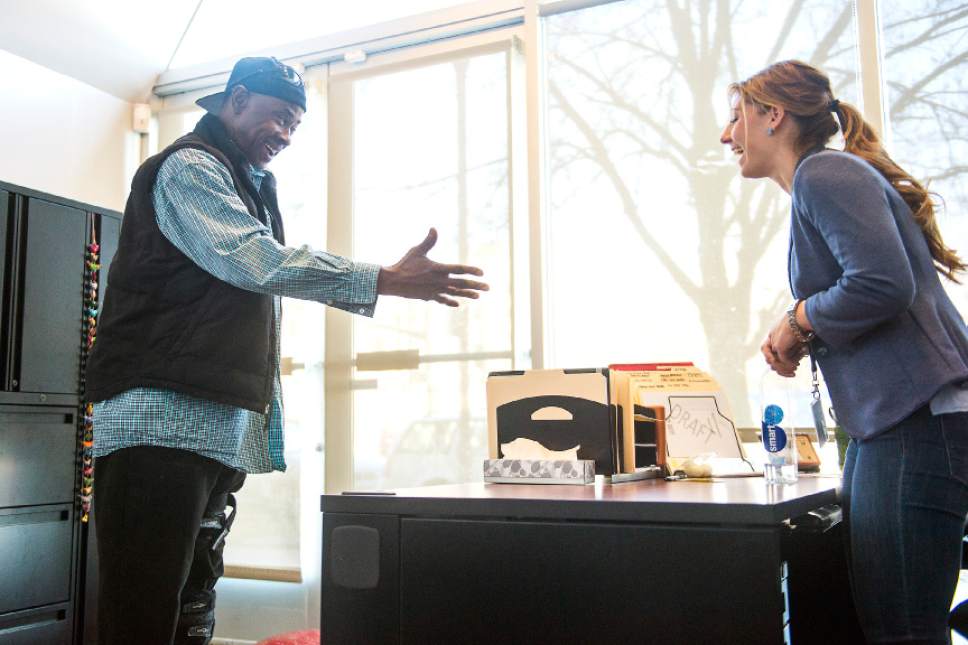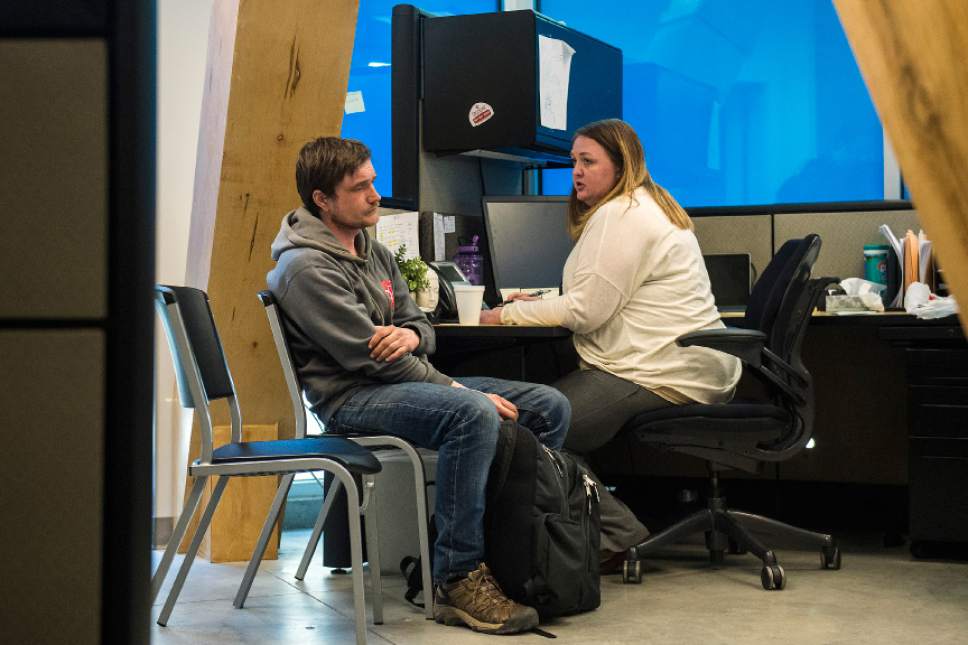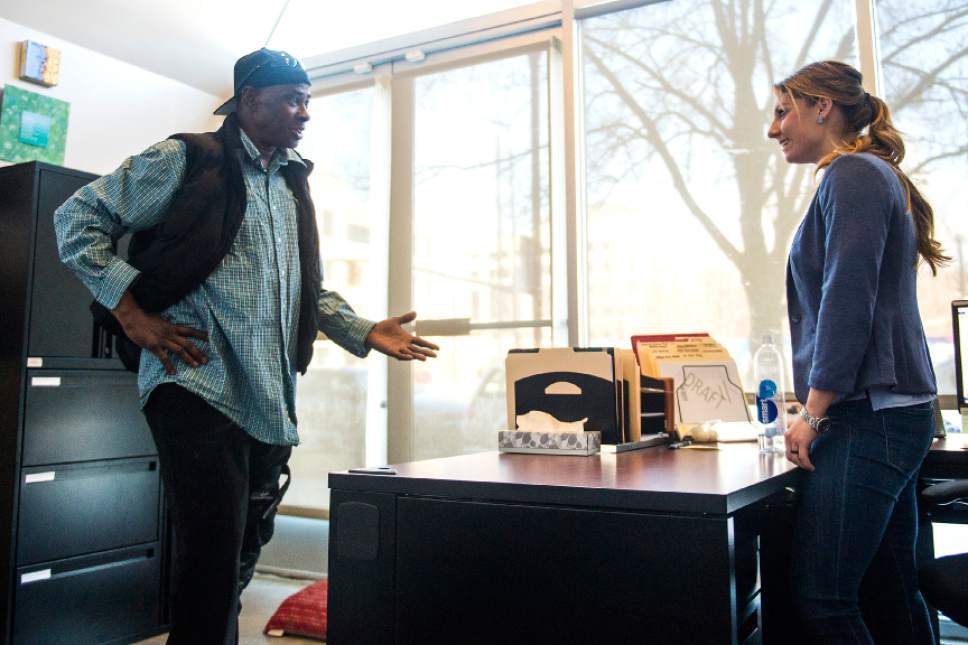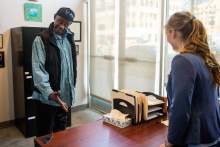This is an archived article that was published on sltrib.com in 2017, and information in the article may be outdated. It is provided only for personal research purposes and may not be reprinted.
First, Salt Lake City's police department gave Eric Bird a citation.
Then the department gave him a list of felon-friendly apartment complexes, two bus tokens and an affirming fist bump.
"Let's talk about some of your barriers to housing," said police social worker Debbie Davis in the department's inconspicuous Community Connection Center (CCC), not far from where Bird had been caught smoking spice on a downtown median.
Bird is one of more than 3,200 walk-in clients seen at the center since it opened in July — many of them, like Bird, referred by officers policing the Rio Grande district's homeless population.
Area law enforcement agencies made headlines in October with three sweeps they branded "Operation Diversion," in which 132 offenders were given a choice between treatment and jail.
Of 68 who chose treatment, 51 absconded.
The greater success story, says Salt Lake City Police Chief Mike Brown, is what the department's newly hired social workers have accomplished through their daily work — straightforwardly termed "Operation Voluntary Clients."
Of 320 people who've received a full assessment at the one-of-a-kind Community Connections Center since the end of Operation Diversion, 93 remain in treatment, while 92 await treatment availability.
Other clients have been pointed toward resources for housing and employment, or sent on a Greyhound bus to families who are willing to help end their homelessness.
The department pitched in to obtain supportive housing for one mentally ill man who had stayed at the 210 S. Rio Grande St. shelter on and off for 15 years and secured a housing voucher for another man who had slept at the shelter 1,000 consecutive nights.
On a mid-February day, Bird spoke freely to Davis about his 2-year-old son, his ambition to return to school in the summer and his struggles staying clean — "I'm hot stuff in rehab," he said, regretfully.
Afterward, jittery and in need of a cigarette, Bird said his past history led him to doubt whether he'd ever fully address his mental health and substance abuse problems.
Still, he said, "I'm glad this place is here."
"It's good to have someone that has all that stuff organized."
—
Triage • Lana Dalton's thin blinds do little to obscure her view of the bustling drug market at the corner of 200 South and 500 West.
Instead, she focuses this afternoon on a gregarious man named Rodney, who has paid her a visit because, he says, "I've got some things I've got to talk about, and we don't have nobody to talk to."
Dalton is frank and unfiltered. One among an array of offbeat motivational materials in her office reads: "Sometimes life sucks ass, no matter how much love, light and patchouli you throw in its face."
The Community Connections Center's mission is short-term triage, not shooting the breeze, and while nearly a dozen people wait in the lobby, Dalton persuades Rodney to schedule an appointment before he returns.
Next, she must inform a woman sent to Salt Lake City from Evanston, Wyo., that SLCPD will not be able to put her on a bus to stay with an Oregon friend until it clears an outstanding warrant with a prosecutor in Washington state.
"She's not going to be happy," Dalton predicts correctly.
It is Dalton's show. The City Council first budgeted for police social workers in 2015 at the insistence of now-Chairman Stan Penfold, and Dalton was hired that November to build a program that would be unlike any other in the nation.
Although many cops work alongside social workers, it is highly unusual for a police department to actually employ those social workers. In most comparable models, county health departments embed with police units.
"To do research on this is nearly impossible," Dalton said, "because it doesn't exist."
She added, laughing, "for good reason."
Some clients are victims or perpetrators in active cases. And while walk-in clients don't get the federal privacy protections they would at a hospital, Dalton's social workers adhere to their own ethics and licensing guidelines, she said.
Brown said there was some internal frustration about that early on.
"Lana said, 'Look, we're social workers, and we're going to find out information about people that we can't share with you.' Cops were like, 'We need to know everything,' and Lana was like, 'No, you don't. Just trust us.' "
Soon, they said, the frustration gave way to gratitude.
Dalton's staff is more qualified to solve many of the problems that officers encounter on calls in the area.
About a quarter of the clients need treatment for substance abuse or mental-health problems, a fifth require housing and another fifth require transportation. One in 10 needs help finding employment. And one in 20 just wants to use a phone or computer.
"We're freed up a lot more," said homeless outreach Officer Michael McKenna.
Added partner Brandi Palmer: "We'll have clients who we're trying to reach out to and they're really police-resistant." Social workers, she said, often have more luck. Davis said some clients will look over their shoulders in the bare-bones office to see who's listening, but "we really assure them that we are not police officers."
And while there may be complications about sharing information, there are advantages to having social workers attached to the department — like rapid deployment.
"The window for providing help to some of these people is sometimes open for a very short time," Brown said.
In one example, Dalton talked down a young man who had threatened to jump off an overpass.
When he was released from supervised treatment, an internal report said her office planned to buy him a Greyhound ticket to attend his father's funeral.
—
Rock bottom • Not everyone in the Rio Grande district is ready for that kind of help.
Palmer, who has made outreach rounds with McKenna for 20 months, said that with some drug users, "You can tell them almost exactly what's going to happen, and they do it anyway."
On a gusty day in late February, the duo was called to speak to an unkempt man loitering outside an apartment complex.
"Daniel," shirtless beneath an unzipped Starter jacket, staggered and stared at the ground as though lost in thought or looking for something as the officers told him about the Community Connections Center.
The behavior is common with spice users, Palmer said. Free to go, Daniel stopped a few paces away to inspect some cigarette butts.
"With just straight-up drug use, [a CCC visit] has to be something they want to do," Palmer said.
They have to hit bottom, McKenna said.
"And rock bottom is relative," Palmer added. "Like, that's pretty rock bottom to me," she said, pointing to Daniel, "but he's cool."
Davis said the first thing the department's social workers do is determine whether there's a crisis that requires immediate treatment. They then assess a client's housing situation, and then try to resolve lingering criminal and legal problems.
Most have challenges that can't be worked through in a single conversation.
Dustin Garcia, originally from Seattle, agreed to let The Salt Lake Tribune observe as he told Davis that he thought he'd finished a detox program with an understanding that officials would help him find an apartment. But there had been a disagreement about his treatment obligation, he said, and now he had nowhere to go. A return to the shelter would bring the inescapable temptation of heroin, he said.
Among Garcia's barriers to housing: a previous eviction and $17,000 in unpaid rent.
"I feel like I've got to take care of so many things," he said, pleading for motel vouchers that CCC didn't have to spare.
"I'm not sure we have a solution for you today," she said. "Let's come up with a plan for tonight, because I really want you to work on your sobriety."
Dalton said many people have the misconception that homelessness is about "getting a job," but it's "way more complex than that."
"If you ask anybody down here, 100 percent would say it wasn't my intention to become homeless, shooting up heroin on [a traffic] island."
Her staff members "have to be flexible, innovative, and willing to throw out their day plans and just roll with what's going to happen next," she said, "because they just don't know."
Last week, she hired a fourth social worker. The office also includes a therapist, two part-time drivers and two office technicians.
The department has hosted visits from the City University of New York and police departments in Anaheim, Calif., and Mesa, Ariz., with interest also expressed by Physicians for Criminal Justice Reform, based in Atlanta, and the Laura and John Arnold Foundation, based in Houston.
Anaheim police Lt. Bob Dunn said Salt Lake City's department was already reputed to be one of the nation's best at homeless outreach, prompting his visit late last year, and he found the nascent caseworker program "really cool."
Though it's "not all rainbows and unicorns," Dalton said, she was surprised that officers have greeted them with the same camaraderie that they afford one another.
"They're tired of being the default social worker," she said, "because that is not their job."
Not anymore, at least.
Twitter: @matthew_piper —
Community Connections Center open house
The public is invited to tour the Community Connections Center, located at 511 W. 200 South, from 1 p.m. to 3 p.m. on Thursday, April 6.



